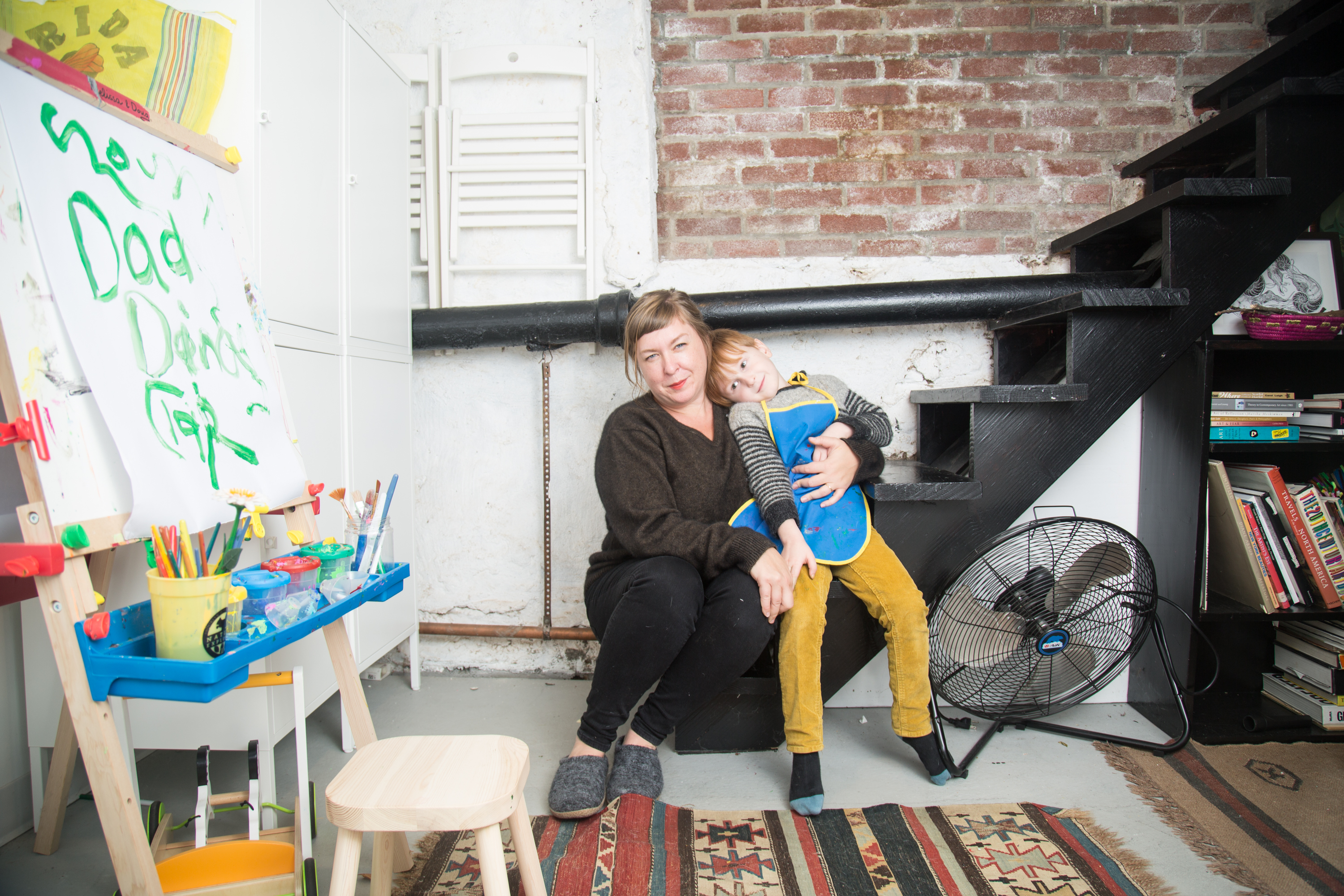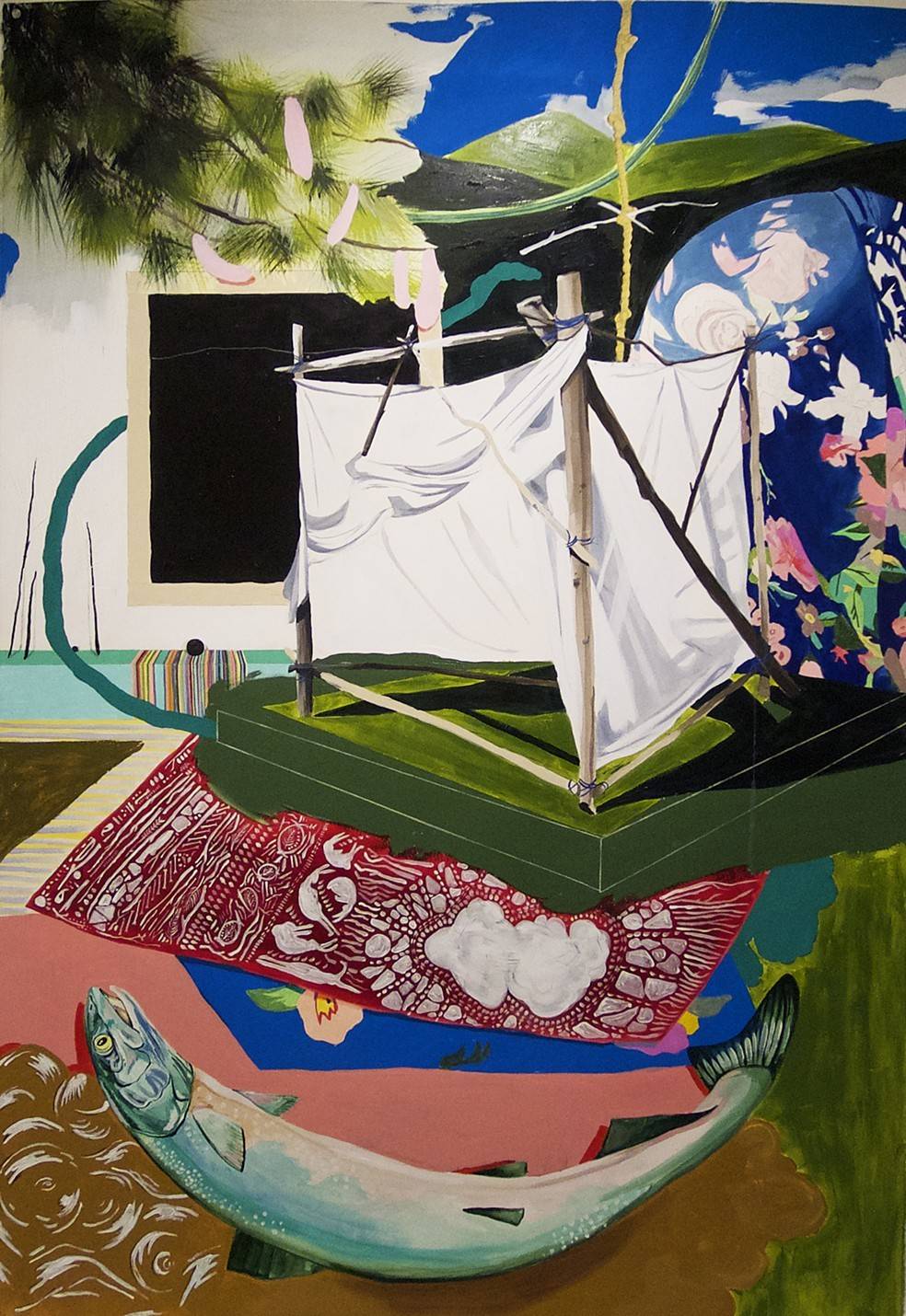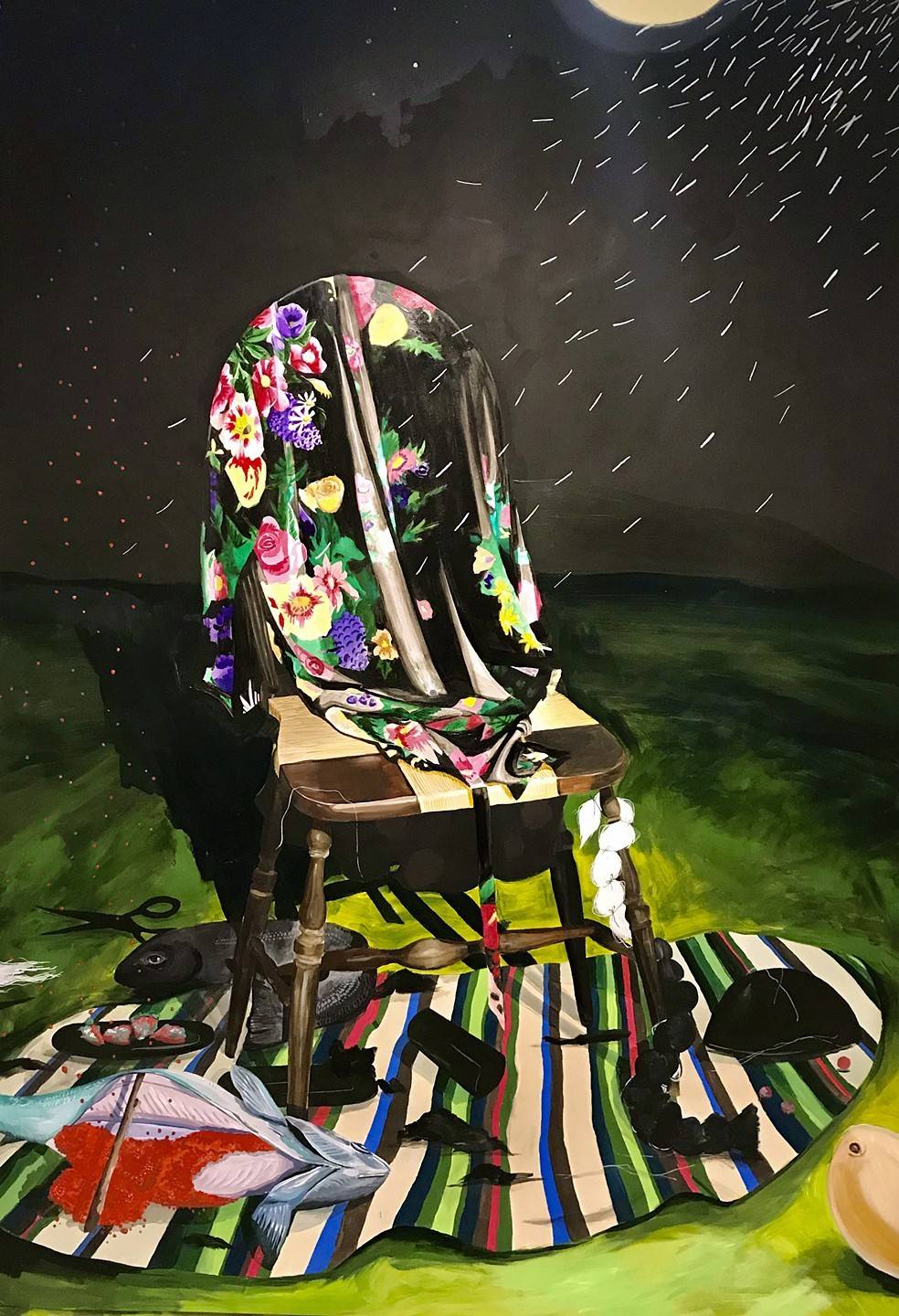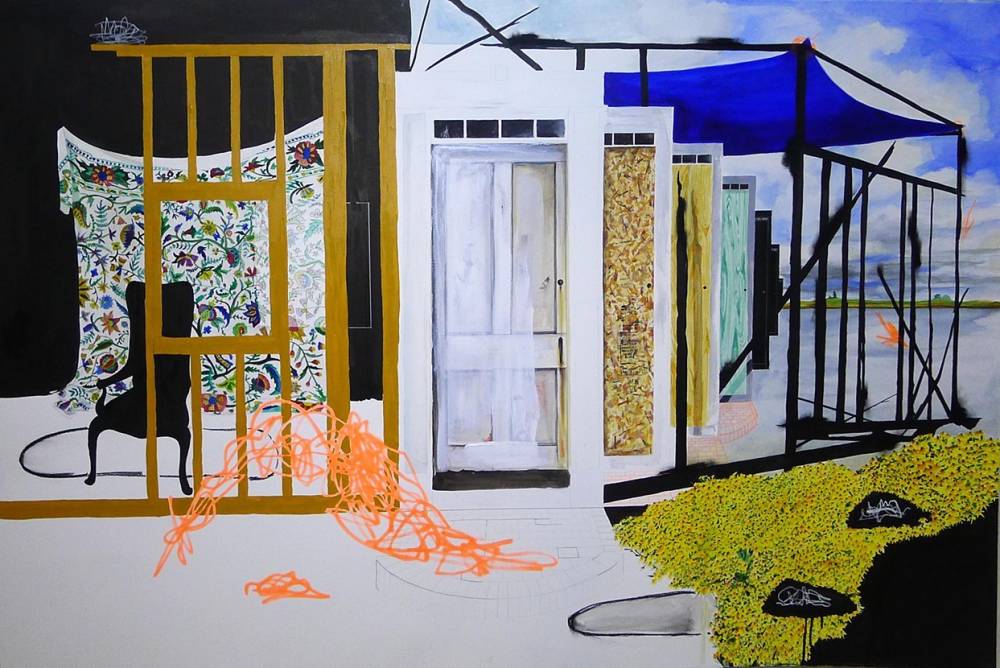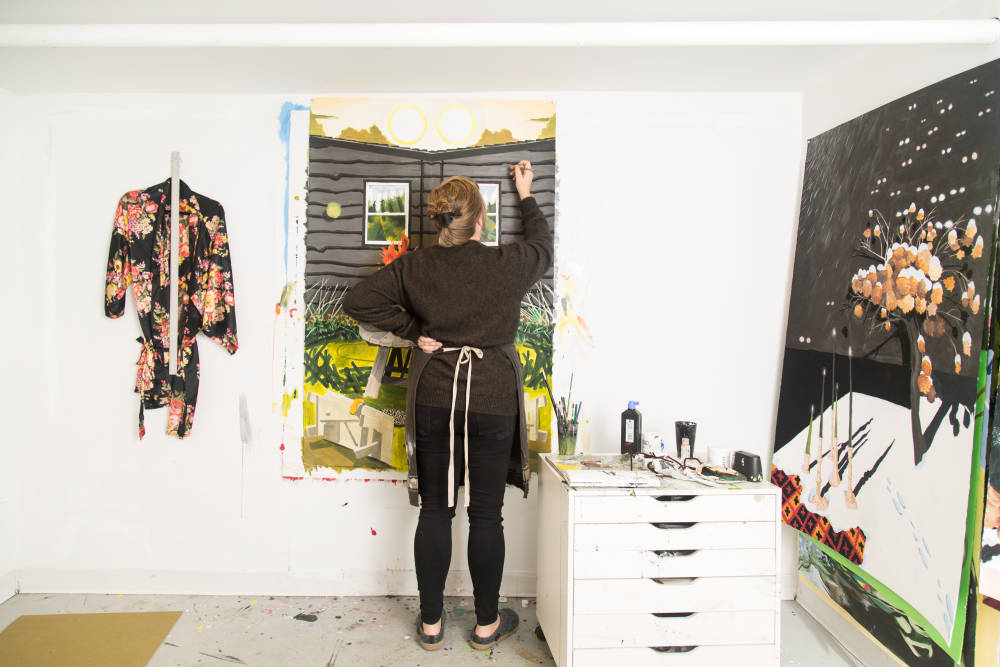I’m so grateful that you reached out to me, because I was on this hiatus after having a baby, and you were the catalyst to getting this thing going again. Yeah. These podcasts were a lifeline for me. You know how it is. It’s hard to find people that are doing the same thing you’re doing. I’m happy to be involved.
So you’re in New York? I live in Brooklyn. We’ve been here since 2005. I grew up in New York, in Peekskill. It’s about an hour and a half upstate. I quickly moved out when I was 18 and headed even further upstate. I met my husband shortly after, and we bounced around a bit, lived in Massachusetts, and in the early 2000s ended up in Brooklyn, and we’ve been there ever since.
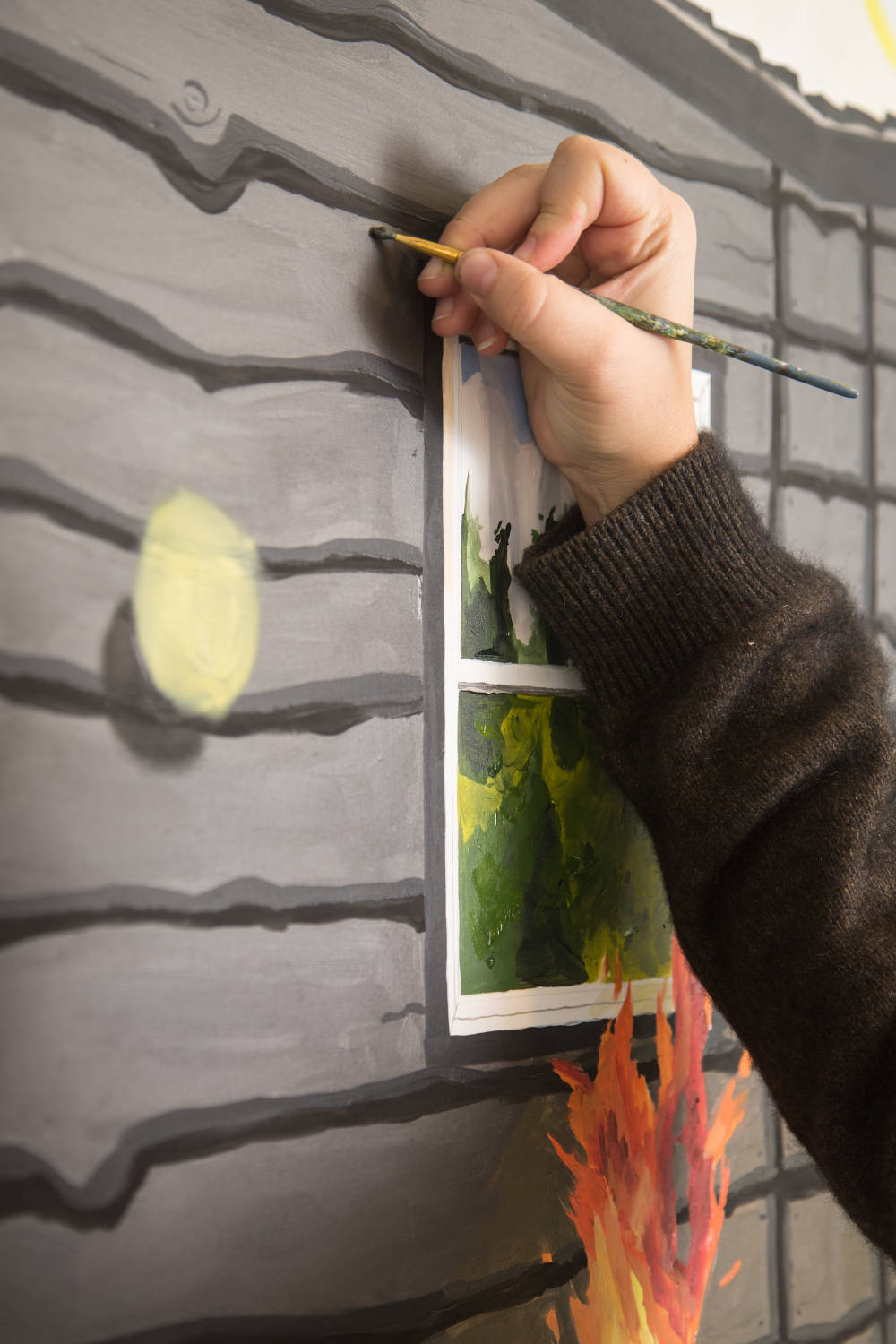
Did you ever have questions about whether or not you should stay in the city when you were ready to have kids? Yeah. Actually we have that conversation daily. Bushwick can be a tough neighborhood, but it has so much fantastic art and culture and food and things to do. But when you’re a parent, you have to pay a babysitter, and these things are not as easy to do anymore. We have a little place upstate in the Catskills, so we are always thinking, “Should we move up that way? What should we do?” But it’s hard to give up the culture here. There’s not as much to do once you leave the big city.
Of course. And you always say, “Well, we can always come back whenever we want.” But in reality, it’s not that easy. It’s not that easy anymore, because my son who is four and a half has his friends. We have his life to think about too. Uprooting him. He’s used to being a little city boy, going to see dinosaurs one day, going do this another day, and it might be a bit of a culture shock to move to the country. He’d probably be fine because he’s so familiar with it. But it is a conversation we have all the time.
Did you go to school for art? I did. I went to SUNY Purchase. I graduated in 2006 with my BFA. I have not gotten an MFA. The time just never seemed right to take on more debt. I studied with Harriet Shorr, and Robert Berlind and Judy Bernstein, Nancy Davidson. So it was a fantastic experience for me then.
“It’s not even what I love to do, it’s just what I feel like I need to do.”
And how did you decide that you wanted to do that as a career? It’s just what I’ve always done since as early as I can remember. Painting was just what I did. I tried going different routes where you can actually make a living. You know, advertisement and things, and it just wasn’t for me. It’s not even what I love to do, it’s just what I feel like I need to do.
It’s a blessing and a curse to have that feeling of “I know exactly what I want to do, but I also know that it’s really hard.” Financially, it’s difficult to make a living. Some years are good, but it’s not a livable amount of money. It’s not even minimum wage. One day. Goals.
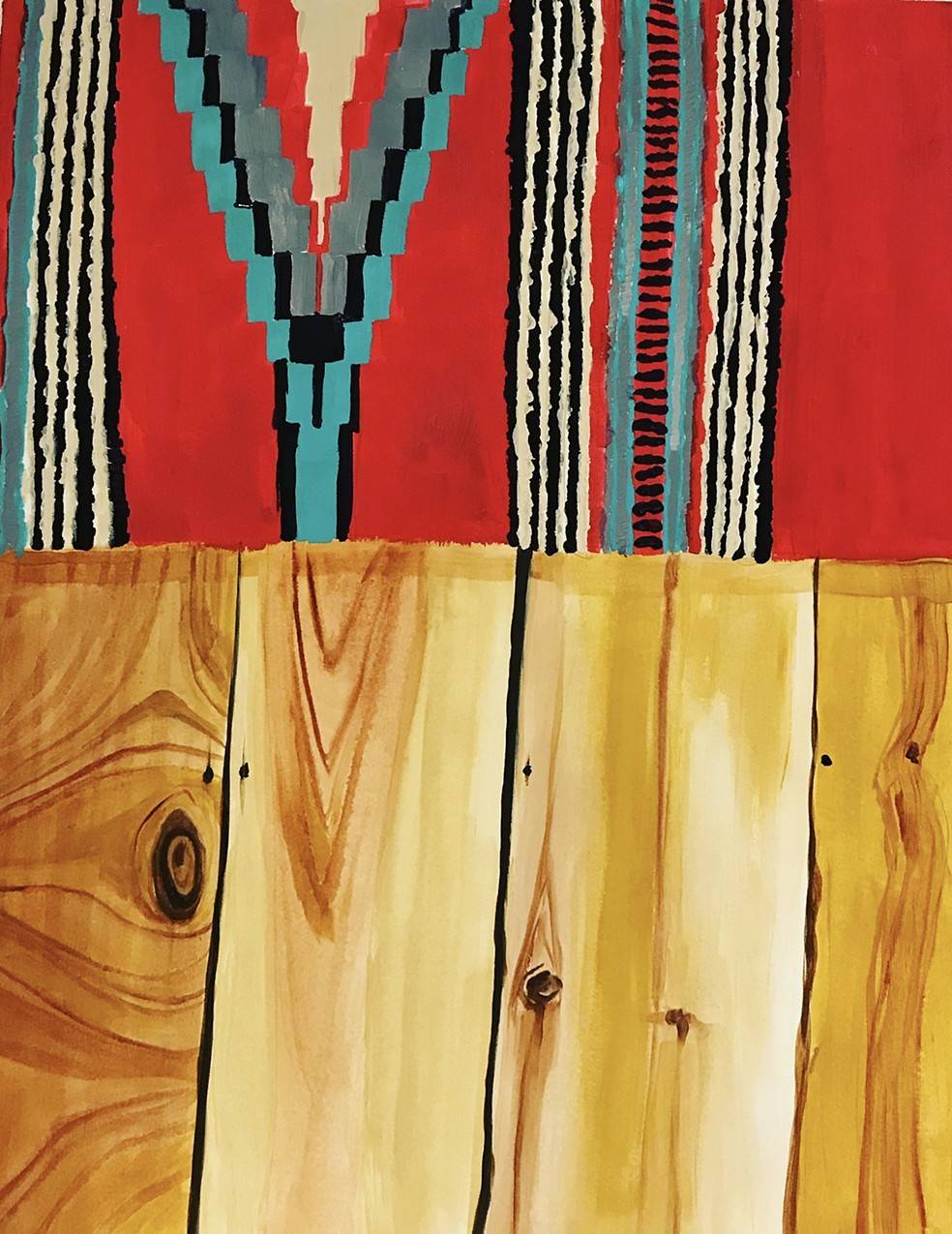
I see your beautiful paintings from your website behind you. Yeah. These small ones here. As Jack is getting older and older, I find myself having more time to work. I wanted to keep the momentum going, and when I do really big paintings, there’s down time between starting the next one. So I started doing these two hour paintings. I’m calling them two hour paintings, because that’s all the time that I have to do them, but it is good to have a time constraint and not overthink things. I started doing these just as exercises, but when I put them all together they really create an interesting narrative of daily life. They’re almost like photographs of things that are important. You might not even realize at the time when you’re focusing on them. But putting them together, they’re kind of poetic, and I’m enjoying doing them.
There’s something about that time constraint that motherhood gives you, forcing you to be super productive and efficient with your time. I’ve found that before I had kids, I couldn’t do that. If I didn’t have constraints on my time, I would just be all over the place. I would too. That is the thing that changed the most from my practice after having a kid. Jack just started pre-K in New York City Public Schools, and it’s given me eight hours every day of the week, which is just mind blowing to me. But I’ve been taking that idea of time constraints, working when I can, and trying to be super efficient in the studio when given the chance. It’s almost that you’re so grateful to have that opportunity that you become super productive. So I’m trying not to fall back to the old way, but it’s just such an interesting new way of working. Maybe it’s just “adult.” Being the adult.
“It changed the way I painted, too, and I think for the best. I’m not giving myself any time to overthink things, and I’m not giving myself, for better or worse, a chance to mess up.”
I don’t think so. I really do think it’s this idea gets planted from the very beginning, of “I’ve got to get back home for the baby.” I ran into this last year when I was preparing for an audition. I carved out two or three hours every day, and I have never in my life been that productive. It’s like, “I have this time. I need to use it or else I’m not getting it back.” Exactly. It makes it really precious, the time that you have. It changed the way I painted, too, and I think for the best. I’m not giving myself any time to overthink things, and I’m not giving myself, for better or worse, a chance to mess up. I work in water-based materials, so there’s really no going back into it to change it around. It’s like everything you do needs to be intentional, because you just don’t have the time to redo it. That travels over to so many other things in life, but it’s made my work really confident, and I’m happy with that outcome of it.
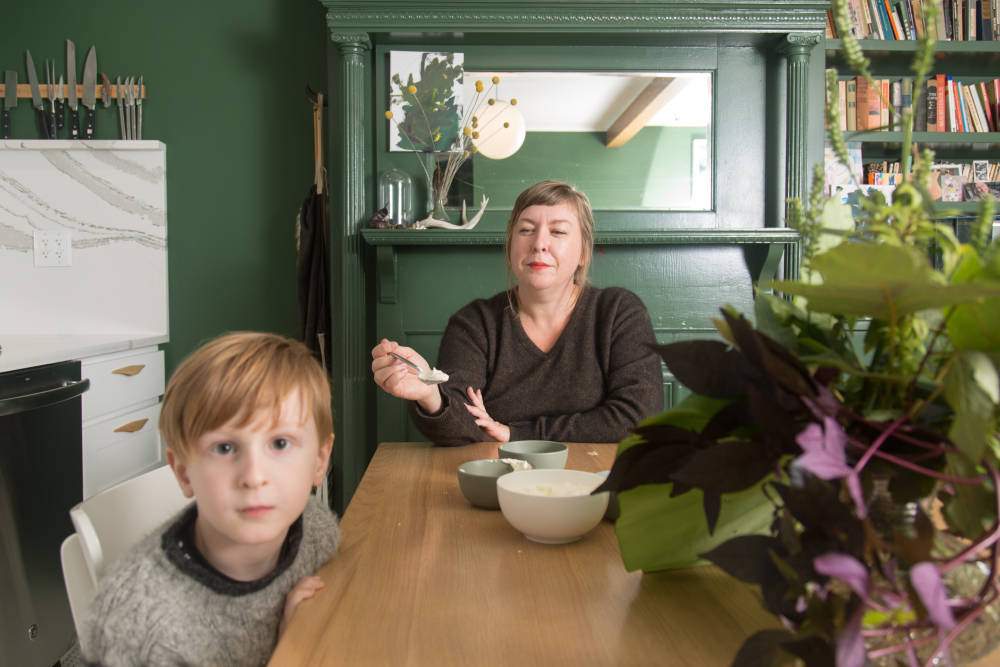
Talk a bit about your new series, Mother Tongue. I am loosely calling the series Mother Tongue, I’m back and forth on that. I was always working when Jack was little, but the work really started to change once I started putting it all together. Or, maybe not change, but I started to realize a pattern in it. I always take a metaphorical approach to my work, collecting objects, and digging through memories and putting everything together in one image. Once I had three or four paintings after Jack was born, I started to realize that I’m making work about motherhood, my experience with motherhood, and exploring emotions that are tough. Tough ones and beautiful ones and really intense emotions surrounding motherhood. That’s the series that I’m working on right now. I’m beginning to think of them more as self portraits, even though there are no figures in them. More anthropomorphizing objects and exploring intense relationships as a mother, with myself, with my child, with my husband, in the world.
“Once I had three or four paintings after Jack was born, I started to realize that I’m making work about motherhood, and my experience with motherhood, and kind of exploring emotions that are tough.”
So when you first started these paintings, you weren’t going at it from “I’m going to make paintings about motherhood”? I wasn’t at all. I feel that there is this sweet spot of finding your subconscious. I’ve always been able to do it when I go see live music, where it’s so loud and the consciousness just kind of fades away and you can dip into this sweet spot of finding things. Or before you go to sleep, or maybe when you just wake up. I’ve been doing that always in my work, and then I started to realize, wow, I’m painting about growing a life, about conception, and collecting things and putting things in order.
Everything I seem to do is about putting things in order and trying to make order of things. Then my work traveled to doing a painting called Sacred Space. Jack’s birth was a challenging birth, and I realized that painting was his birth story when I was through with it. As I started to realize what I was doing, the theme has become more intentional, but it hasn’t really changed the mission of them at all. So we’ll see if I ever, I mean, I’m always a mom now, so we’ll see if it ever changes.
I go back and forth with talking about whether they should be publicly known about motherhood, or not. When I have studio visits I feel like people really relate to the paintings who aren’t parents, or they just relate to them in their own narrative. So I don’t know. We’ll see.
That’s really interesting. Just that you allowed your subconscious to do the work for you. And it’s become relatable to others, even though the subject matter is different. That’s so important to me. Making human connection, not on a conversational level, but on a really deep emotional level. I feel like that’s when my work is most successful.
I think it’s okay to let it be known that they’re about motherhood. It’s art, and it means something different to everybody. It sounds really interesting. Have you been posting about that work at all yet? I post the work a lot. The titles are a little ambiguous, too. I don’t think that if I didn’t explain that they’re personally my experience about motherhood it wouldn’t be apparent, but I’ve been posting the work on my website and on social media and I’ve had some press and interviews and things about the work.
I say let it be known. I know, I know.
But don’t we always have a little apprehension when we’re talking about motherhood? Even though it’s relatable to everybody? We’ve all had mothers! That, of course, is always on my mind too. But do I want the work to speak on its own? I don’t know. But I’m just going to be honest. It is what it is.
I can’t even imagine having eight hours a day to work. It probably trickles down to two, really. But those are two really great hours! It was such a huge transition, because he would go to school for three hours a few days a week, and that was a “get nothing done” time. I thought I would be able to do work, but it’s really not enough time. And I always had a hard time leaving. He would cry, and it was very emotional, and I would always leave feeling guilty that he was not happy when I left him.
Jumping into New York City Public School, leaving my child for 30 hours a week, I was like, “How is he going to survive? What is he going to do without me? He’s going to be upset every day!” And man, he is just this powerhouse of confidence, going into school, doing it. And that really took me by surprise. It really was emotional for me to see him kind of moving on in a way that he never has before. It took me a little bit of time to know that it’s a good thing, and put my nose back into my work. Now I’m in the groove and it’s fantastic and I’m so appreciative of this time I get to work in my studio.
And then when you have him back at the end of the day, you can be with him. I can be with him. I mean, it’s a lot, as you know. And there are a lot of emotions involved in the day and sometimes frustrations, and now it’s pretty good. Everything’s pretty much good when we’re together, you know? It’s wonderful. It’s a wonderful transition and I’m so happy for doing this pre-K thing. It’s good for him, and us, and all of us.
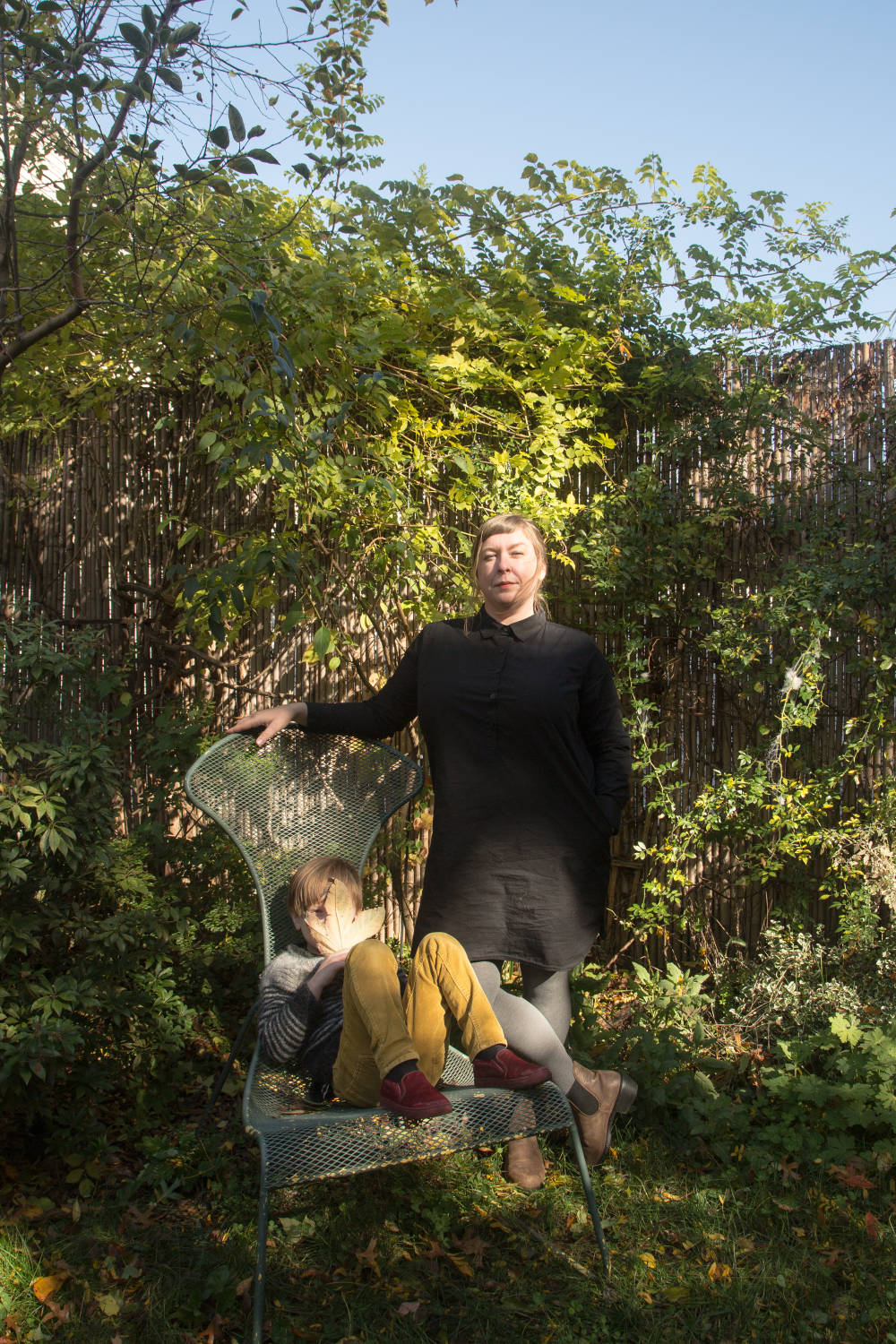
What surprised you the most when you first became a mother in that first year, in regards to how you would do your work? The first year was all a surprise to me, to be honest, because I was really anticipating being scared and being nervous and being alone and having a baby that didn’t sleep and cried. And much to my surprise, everything was different, and I know that’s not everyone’s experience, but the first nine months of Jack in our lives was the most magical, peaceful, well rested time I’ve ever had in my whole life. He was a really good sleeper and he was such a happy baby, and I was so productive. I worked so much. I thought I had this whole thing licked. I was like, “This is so easy. This is just fine.” I was having shows. I had a solo show, I was in a few art fairs, and everything was so, so great in the beginning. And then when he turned about nine months old he started walking. All this magic started falling away, because I had this little tiny baby that was walking, and getting into everything and falling and having to get stitches, and then running at like 11 months. Just running everywhere. Oh my gosh, I just remember walking around with “parentheses arms” for about two years and that’s what I remember after that. It’s all a blur.
“In my midwife’s office, she had a poster that said ‘surrender.’ I never wanted to look at that poster, but it’s the biggest lesson I’ve learned in parenting.”
Not much was getting done in that time. No. And he hasn’t stopped since. He is just so determined to just go. Everything has been a surprise. The pregnancy experience, the birth. Everything is a surprise, and it’s not one I expected, for better or for worse. In my midwife’s office, she had a poster that said “surrender.” I never wanted to look at that poster, but it’s the biggest lesson I’ve learned in parenting. You just need to surrender to whatever is happening.
So when he turned a year, probably for a year and a half or so, though I continued to make work, I think that was the toughest time for me. He was a great sleeper at night, but not a good napper, so I would drive him around in the car and then have to sit there for an hour. I decided that I would take that time to make a studio plan, so I could just execute when I got into the studio, when I did not have much time to think. During those down times, I thought a lot, I planned a lot, but I just didn’t have the hustle to go to openings or do anything else but try to make work.
Now it’s getting easier, I would say in the past year or so. He’s four and a half now. It’s getting easier all the time. I made him a studio in my space, and we are studio mates and we co-work, sometimes. Though during that really tough time, where he was just this wild, wild child, I felt so guilty I wasn’t working. And I wish I didn’t, because it was such a short period of time. You can’t see beyond that moment, ever, when you have a baby. I think I can imagine the future more now that he’s a little older, but when they’re a baby, that moment is it, forever.
It’s true. And that’s what’s so heartbreaking about it. Because you don’t know what happens next, it feels like, “This must be forever now,” and that can be really scary. Yeah. It is. I was really hard on myself, but I shouldn’t have been, at all. Really it is so short. Everything is so fast and so short. But in a way, feeling guilty and feeling bad, forces you to choose a new direction; it could make you feel worse, or you could use it to do better.
Now that he’s in school, how do you make sure to prioritize your time? It’s hard, because I didn’t realize how involved you need to be in pre-K! I was all gung-ho the first couple weeks, and then I was like, “Ok, I need to take a step back. I need to work.” Every day is something new at the school, and it’s so great to be involved and it’s so nice to be in the classroom, but I have made myself a schedule. I’m a stay-at-home mom too. My husband works a lot, so all of the house things come to me. We have two apartments too, so I’m also a super. We have a lot of stuff to do, but I push it to the morning and the evening, and make sure I have at least three hours in the day to work, which doesn’t sound like a lot, but it’s a lot. Three hours every day to work has been really fantastic for me, productivity-wise.
“You have to find the value in your work.”
Spiritually, it’s really great to be back in my studio, because there was a time where I wondered if we should make it into a playroom for awhile or something, you know? It was a place that made me sad. Now it’s really great to be back in there. It’s so hard to prioritize your time for yourself, because I could totally have the opportunity to go do something else. I could go grocery shopping, I could pay bills for hours. You have to find the value in your work. Especially if you can find people through studio visits or interviews that your work can speak to, it’s fuel for making work, for me, anyway. I like that human connection of making work. It makes me want to be more productive.
Your studio is in your home? It is, yeah. I have a little subterranean lair in Brooklyn. There’s no sunlight, but it is so quiet, which is such a relief from living here. I don’t have a studio upstate, but in the warmer months, those few months, I work outside and do a lot of these smaller paintings there. Even though I’m not painting as much in the mountains, I feel it’s the best place for me to think and come up with ideas and I’m really, really inspired by the area and the spirituality of the woods, the deep, dark woods.
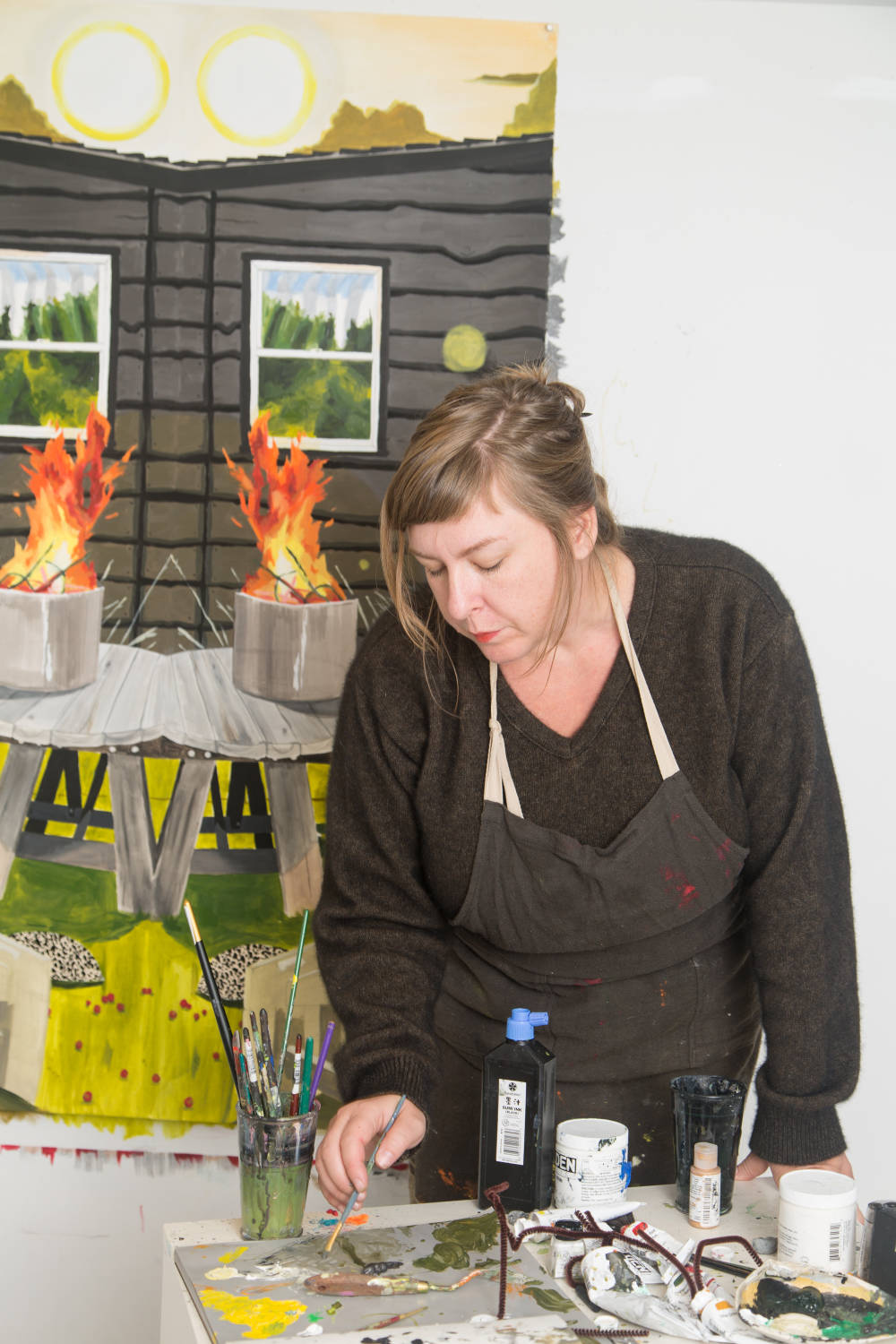
How wonderful to be able to get there so often. It’s pretty great. I mean, there’s a lot of reality in it too. It sounds great. We were like, “Let’s get this cheap little cottage. It’ll be so nice to go up.” And then, just like everybody says, it’s so much work and there’s so much worry. We got it when Jack was very little, like six months old, so we did a lot of work on the place in hopes to be here now, when he can really enjoy it and be through with all the projects. We just wanted to get everything in order for now. It’s kind of working. Fingers crossed. For now, it’s working.
For me, it’s just so important to get into nature every once in awhile. It makes such a huge difference. I bet for you too, especially living in New York City where you’re in the opposite of that. It’s true. We have a nice garden here in Brooklyn, I love to garden, and it’s been beautiful to share with Jack and give him a little nature space here. But it’s still in Brooklyn, and everything is still covered in some black film, so it’s so nice to get upstate. The house we have is on a hill, and he learned to run down that hill at a year old or so, and would tumble into the wet grass and ran around with our dog and ran through the woods naked, and it’s just so important for him. He has such an affinity for nature, now, even at such a young age, and a respect for nature, which is really important to me. That he knows that from a young age. It’s a very special place up there in general.
“The house we have is on a hill, and he learned to run down a hill at a year old or so, and tumble into the wet grass and run around with our dog and run through the woods naked, and it’s just so important for him.”
I want to hear a little bit more about those two years that you said were really tough. Can you just speak a little more as to what made it so hard for you? Well, it was me and Jack. It was the two of us. My husband works long hours, even though he’s very involved. On the weekends I would just kind of peace out and try to go to the studio and hand over Jack. We’ve been together literally for 20 years, and I’m just turning 40 this year. So we’re really solid. We’re really good together, but it was really hard on our relationship. Just this constant handing off. Constant hovering. Don’t put that in your mouth. Where are you? Running away. He always runs away. It was so much, just, always looking over your shoulder. Always having to think “Is he okay?” He’s getting better. He’s just always excited by something and doing something wild, or standing on something. And I’m always running to him. And it’s just so exhausting. We had time to say “Hi” and “Bye” and go to sleep and it was just kind of a blur of those years.
We decided to put him in a little play school for nine hours a week, and it was great for him. It was really good for him, and it was nice for me to be able to take a walk or do something, just clear my head for a second. But yeah, it was hard to not have your own mind, just to be constantly taken over. And then not know what the future is: “Is this always going to be like this?” Of course, you’re always going to worry, but I just couldn’t see… I don’t want to say “What did we do?” because it was fantastic as well, but it was really hard for us. Especially coming from such a glorious start and thinking that that was the way it was going to be. It was hard. And we don’t have family close by, so it was really just James and myself, and Jack. And a dog. We decided to put a puppy in there too.
This is really hard. Let’s make it a little harder. How can we make this harder? Get a puppy. That’s the story of our lives. Finally, finally. Ok, once everything gets really good. We’ll just be like, let’s put this on top of it. We can do that. That’s kind of the way we decided to have a kid really. We never thought about having children. We were just living our best lives and doing music and art and then one day we were like, “Hey. It’s now or never!” And then we just did it. And then Jack came storming in!
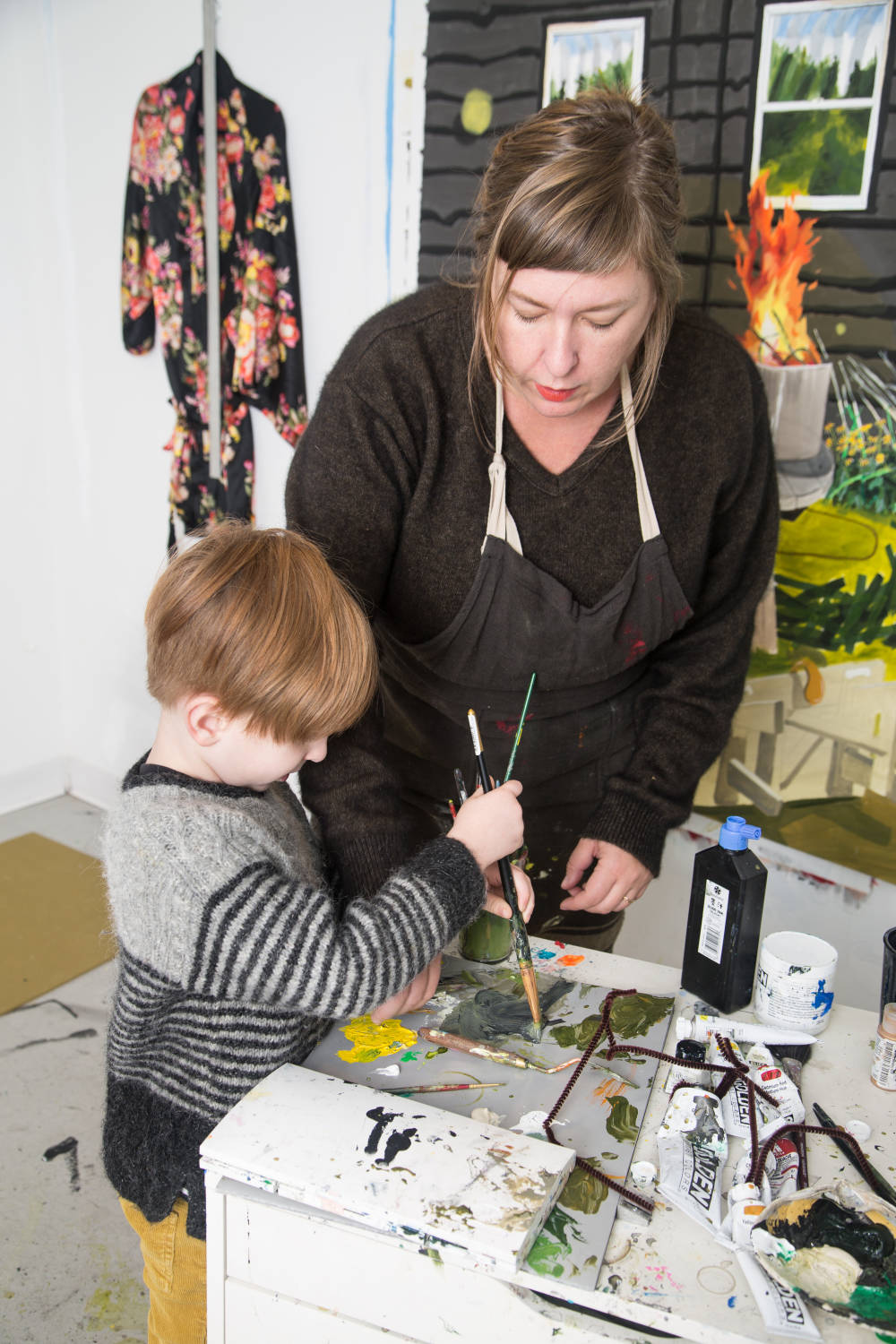
What does your husband do? He’s a surveyor in the day time, and he’s a musician afterwards. He plays mostly guitar, but he’s very into electronic synthesizer-type things, and building them himself too. He has a studio next door, and he makes a lot of noise. We always thought that would be trouble, but then we had a kid and neither of us could be working at the same time anyways, so it’s not a problem!
What are you most looking forward to in the future with your work and in your family? This! I mean, I’m kind of really into this right now. Getting into school, and getting back to work. I suppose having more opportunities with my work and seeing what my efforts in this new series can culminate into, and maybe heading to the mountains. We’ll see. I’m looking forward to life being easier and more artistically focused. We’ll see if we get there, but right now I’m pretty proud to be where we’re at, because I feel like we worked really hard the past few years.
It must feel so good to be like, “Okay. We’re here.” We’re here! How we did it, I have no idea. It really smacked me in the face. The first day I dropped him off at school and he just kind of walked away and was like, “Bye!” I was expecting tears, and then I was the one who had the tears, and the past four years just smacked me in the face. What just happened?
Do you have that sense of “I should have appreciated it while I had it” or do you feel like, “I had to go through all that to get here.” I feel like I had to go through all of it to get here. I did appreciate it. I’m talking so much about the stress of it, but I appreciated it so, so much. He’s a fantastic boy, and we have a lot of fun together. But I feel like the whole journey of it, and appreciating the steps and the journey to get where you are is really important too. I’ve always appreciated experiences, which is, I think, why I make the work that I do. Collecting experiences in work, and ideas and things.
“Find your community early on. Not an art community, or whatever your old community was, just any community of new mothers.”
What advice do you have for other Mother Makers? Find your community early on. Not an art community, or whatever your old community was, just any community of new mothers. Maybe in your past life, you would not get along with this person, or you wouldn’t have the same interests, but there’s something so fantastic to meeting new moms who just went through the same experience you did, and building a community of people that you could text in the middle of the night and wondering, “Does your baby have this weird rash?” or, “What’s going on? Is your baby doing this?” That was so important for me, and it was something that I didn’t think that I wanted at all. I didn’t want to be part of “mommy groups” or any of that. And I guess I wasn’t really in a lot of the groups. I was early on, and then met people and they’re just really special friends, and quick friends too, people that you can really relate to in no other way in another situation.
Also, be kind to yourself. My only regret in the past few years is not giving myself a break, and not realizing that I was raising a child. What it actually means to raise a child, and not to be so hard on yourself if you’re not making work the way you used to. It’s such a short period of time, and you’ll be back, and better, I think. But it’s hard to realize that at the time.

